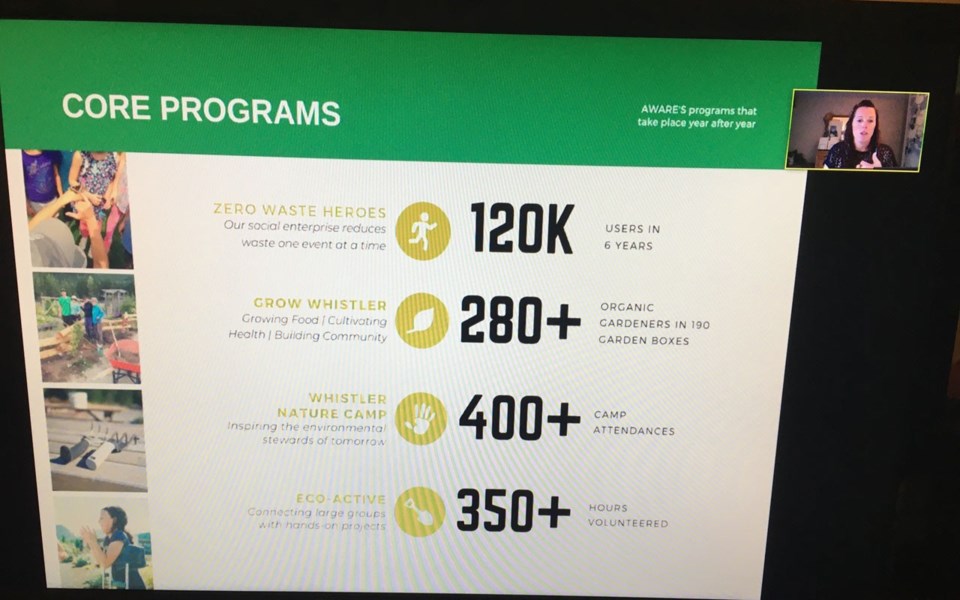WITH THE BEGINNING of the year usually representing a quiet time for the Association of Whistler Area Residents for the Environment (AWARE), executive director Claire Ruddy opted to take a two-month sabbatical to start 2020.
"It was to kind of disconnect and go away and think about what this year would bring—obviously within two weeks of coming back everything changed," Ruddy said at AWARE's annual general meeting, held virtually by Zoom on April 22.
"So we're adapting as we go here, as everyone is."
Though the first quarter of 2020 was mostly unchanged for AWARE, with zero waste workshops happening in schools throughout the region, Q2 "is going to be heavily impacted" by COVID-19, Ruddy said.
"Our spring break nature camps were cancelled, and we obviously immediately cancelled all of our general programming, which includes things like our EcoFlix environmental movie screenings that we do, and zero-waste related events with the bi-annual clothing swaps and garage sales," she said.
"And all in all we are confirmed or highly anticipating a revenue drop of at least $120,000, which represents half of what we generated in revenues in 2019."
Losing the Zero Waste Heroes program makes things especially difficult, as (unlike most grants), revenue generated from the program can be used for anything in the organization.
"Without events this summer, we won't be offering Zero Waste Heroes, which will then mean that we are not able to generate those funds that we use for the other parts of our work," Ruddy said.
Content from planned summer nature camps has been shifted online (at awarewhistler.org), so "you can actually now, for free through our website, access nature activities that you can do as a family ... out and about in our Whistler backyard so that we can still support families and youth in learning more about nature," Ruddy said.
With community gardens being recognized as an essential service, AWARE is also working to keep its garden and greenhouse program running.
"Obviously that program has huge value in terms of giving people the ability to grow their own organic food, but also it has implications in terms of mental health," Ruddy said, adding that there are "bonus sustainability goals" associated with the program as well.
"So we'll keep people who are registered for that up to date."
Further, a "climate action campaign jam" that AWARE was planning is also shifting online.
"[It] was going to be a full-day, Sea-to-Sky-scale, 150-people-plus social marketing campaign partnership building event to build collective momentum on behaviour changes around climate actions that have the greatest impact on our shared climate goals," Ruddy said.
But based on what provincial health officer Dr. Bonnie Henry has been saying lately, "I think now we'll be looking at ways to take that online and then switch it into more of a virtual format that we can still get a really good level of engagement."
At the outset of the meeting, Ruddy asked participants to offer one word that describes how the experience of COVID-19 makes them feel.
The answers, for the most part, showed signs of hope: Reflective. Grateful. Responsive. Thankful. Motivated. Introspective. Relaxed. Inspired.
"It's interesting, because doing this in the first week or so, a lot of the comments were: loss, grief, anxiety, and some of these seem more hopeful," Ruddy said.
"It looks like we've kind of come to grips a little bit with what this looks like and we're able to feel more empowered as individuals."




